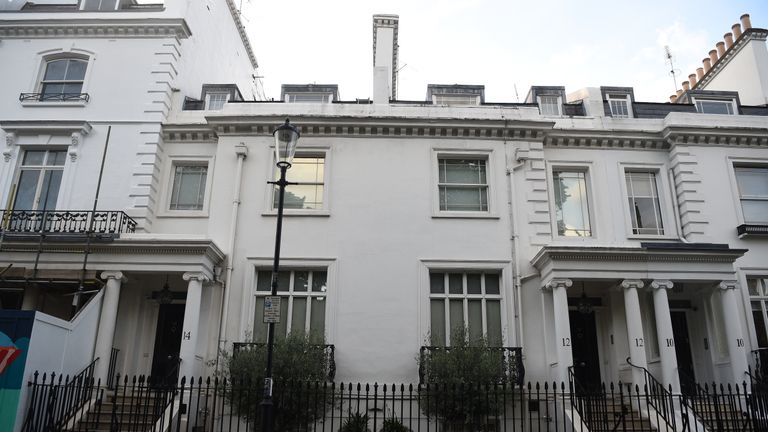Zamira Hajiyeva: Woman loses battle over UK's first unexplained wealth order
Zamira Hajiyeva was trying to overturn an unexplained wealth order against a property in Knightsbridge that was bought for 拢11.5m.
Wednesday 5 February 2020 14:16, UK
A woman who spent more than 拢16m in Harrods over a decade has lost her challenge over the UK's first unexplained wealth order (UWO).
Zamira Hajiyeva is married to "fat cat international banker" Jahangir Hajiyev, a former chairman of the state-controlled International Bank of Azerbaijan who was convicted of fraud and embezzlement and sentenced to 15 years in prison.
The 56-year-old was attempting to overturn the UWO against a property in Knightsbridge that was purchased for £11.5m in 2009 by a company incorporated in the British Virgin Islands.
Such an order allows the National Crime Agency to seize someone's assets if they believe the owner is a politically exposed person (PEP) - someone from outside Europe who is in a position of power that makes them liable to bribery or corruption - and they are unable to explain the source of their wealth.
Ms Hajiyeva had attempted to argue that her husband's conviction was the result of a "grossly unfair trial" and should be discharged.
But three justices at the Court of Appeal have dismissed her challenge - adding that her application for permission to appeal their judgment has also been denied.
UWOs were first brought into force in January 2018 under a range of so-called "McMafia laws", and Ms Hajiyeva was the first person to be made subject to one of these orders.
In a High Court ruling in October 2018 - dismissing Mrs Hajiyeva's initial attempt to overturn the UWO - Justice Michael Supperstone said that "three separate loyalty cards were issued" to her by Harrods, where she spent more than £16m between September 2006 and June 2016.
Court documents later revealed that she splurged £600,000 in a single day during the decade-long shopping spree.
The NCA subsequently seized jewellery worth more than £400,000 from Christie's over suspicions about how the items were purchased while the auction house was valuing the jewellery for Mrs Hajiyeva's daughter.
After Wednesday's ruling, Sarah Pritchard, director of the NCA's National Economic Crime Centre, said: "This is a significant result which is important in establishing unexplained wealth orders as a powerful tool helping us to investigate illicit finance generated in, or flowing through, the UK."
At a hearing in December, Mrs Hajiyeva's barrister James Lewis QC argued that her husband's conviction was a "flagrant denial of justice".
He submitted that Mr Hajiyev was not a PEP, claiming that the NCA had "seriously mischaracterised" his job by describing him as a "government official" as the International Bank of Azerbaijan was not a "state-owned enterprise".
The Court of Appeal ruled that, if the bank was a state-owned enterprise, "Mr Hajiyev fell within the definition of a politically exposed person because he was its chairman".
It added that his wife "was also a politically exposed person because she was a family member of Mr Hajiyev".
In September, Mrs Hajiyeva fought off an attempt to extradite her to Azerbaijan to face fraud and embezzlement charges on the grounds that she would not get a fair trial.







